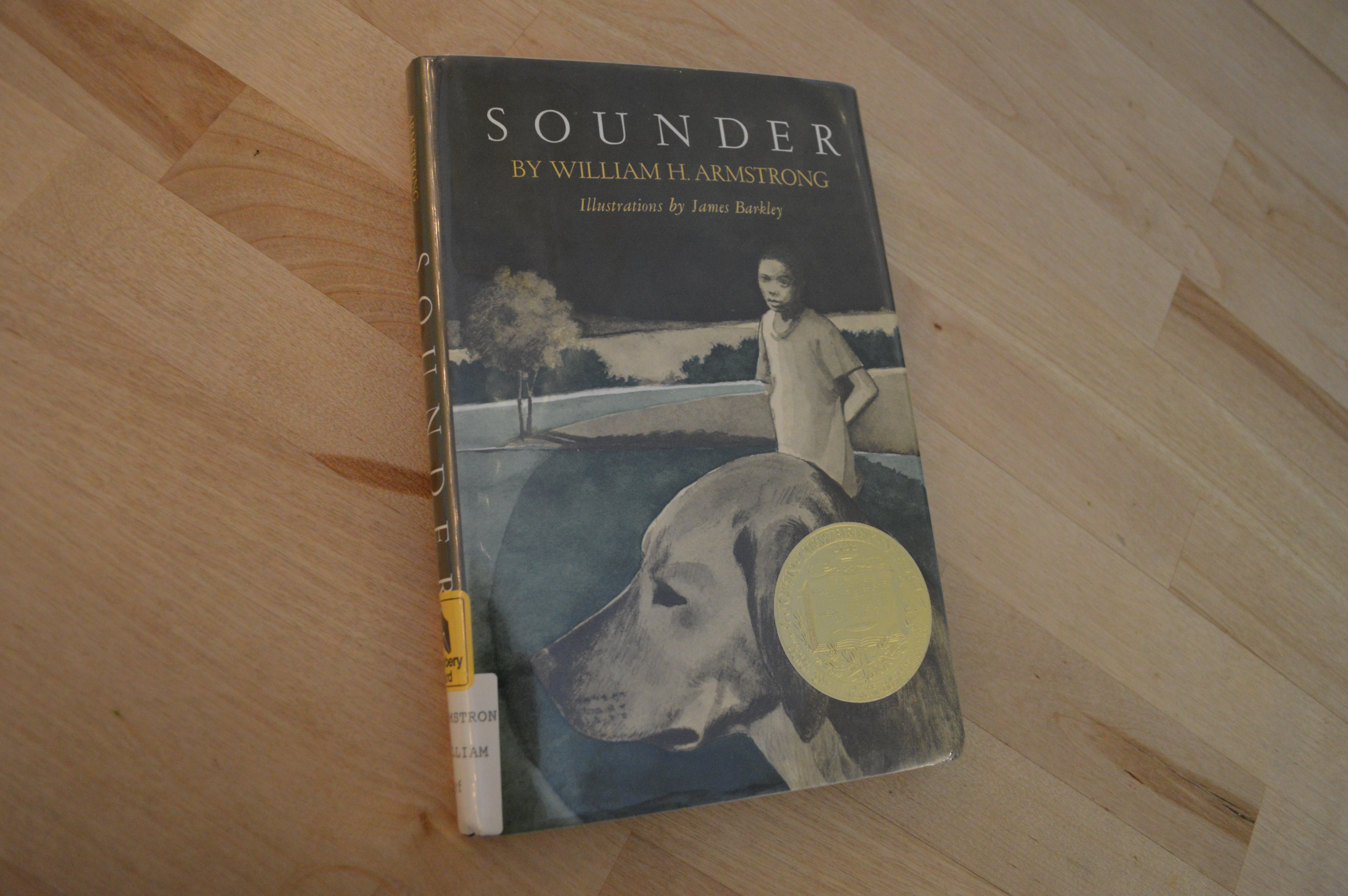
William H. Armstrong’s 1970 Newbery Award Winning book, Sounder, is not really a book to like or dislike per se. If it weren’t based on a true story, maybe it’d be easier to like it or dislike it. But instead it just is. It’s the evocative and very difficult story of a young African American son of a sharecropper whose father steals some meat for his impoverished family, and the next day when the authorities come the family’s beloved dog Sounder gets shot in the process of the father’s arrest. And, well, the story pretty much stays sad and difficult through whole thing with a sliver of hope in the unnamed main character getting to finally have a chance at an education in his search for his father at a labor camp.

What I liked. What I appreciated (since “like” isn’t something I think is particularly appropriate for this book) is that this book brings the absolute suffering and injustice of racism and poverty and sharecropping in the South into such a tangible and understandable scope for children. In many ways, the dog Sounder isn’t really what the book is about, and yet he, in his suffering and perseverance and connection to the father, is the metaphor for the book, and something small enough for children to understand. My own childhood dog, a sweet golden retriever named Amber, died very shortly before my beloved Grandma Irma when I was ten. The grief for my Grandma, who had been a primary caretaker for me as a baby and very involved until her death, was, I think, transferred to my dog dying. The two griefs intermingled, and I think it was easier for me to work through the smaller grief of my dog as a way to work through the grief of my grandma. That’s why I think books about dogs dying for kids serve such an important role in childhood.

What was interesting. I think the introduction to the book in which the author described meeting the grown up boy as his teacher who told stories, including this one about Sounder, made the whole book much more powerful to me, and hopeful since we know that the young boy grew old and wise and kind despite (or because of) the difficulties he faced in the story.

What were some limitations. It’s hard to say that this is a limitation, but I think that the deep sorrow and lyrical melancholy of the book make it one of those books that’s important, but hard to be someone’s favorite. It was true and hard, but I think that books that people want to return to again and again mix joy and sorrow. There’s nothing wrong with a 95% very sad book, especially one about such a real and hard thing. But I think that means the book has as its primary purpose to create empathy and understanding in the reader, rather than to entertain.

Similarity to other Newbery winners. Remarkably, it’s the third Newbery winning book about an African American character—the others Amos Fortune, Free Man and I, Juan de Pareja—were about the emancipation of very well educated and long-suffering men based on a few historical records about each. There are a handful of other Newbery winning books that have a majority of the plot surrounding serious injustice and difficulty of the main young characters (Johnny Tremain, Carry On, Mr. Bowditch, The Witch of Blackbird Pond, Island of the Blue Dolphins, and The Bronze Bow come to mind) but this one perhaps is the uniformly saddest book of the bunch, and perhaps the one written most like a poem.

What it teaches me as a writer. I have a hard time making my characters go through hardships, but of course that’s the whole point of a book! I think I worry about my characters sounding whiny or it feeling overly melodramatic. But Sounder didn’t have a trace of those things in it, and it was nearly all just rough things happening to this sweet little boy. I think the way that Armstrong gives his main character such incredible hope, hope for his dog, for his father, for finding his father, and for getting an education, makes the difficulty of the book something that’s not distracting or a deterrent to the reader. In Amos Fortune, Free Man and I, Juan de Pareja the main characters have hope and a great deal of forgiveness and kindness for their oppressors, which is admirable but also can come across as a bit passive and not portraying an adult’s full emotional reaction to injustice by not portraying the anger. The main character in Sounder doesn’t have anger either, but for some reason I feel like there is anger in the reader for his and his family’s mistreatment, even though he continues to primarily live in radical, unfounded hope.

Have you read Sounder? What books do you remember as important for you to understand injustice as a child?

*Note* This post contains Amazon affiliate links, which means if you were to buy a book, I’d get a tiny commission at no cost to you. Thanks for supporting Stories & Thyme!*
